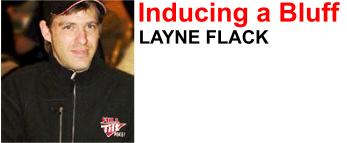Play More Pots

In tournaments, I play lots of hands. I’ll put my money in with all kinds of connected cards, especially when in position. I might limp, I might min-raise or raise a little more than the minimum, depending on the circumstances. I’m looking to keep my table off balance so they don’t know where I’m coming from.
My overall goal is to pick up a lot of small pots without a lot of resistance. I might raise in position and hope for a call from one of the blinds. If I raise pre-flop with something like 6-7, I might miss the flop entirely, but the raise puts me in control of the hand. On the flop, I’ll likely bet if checked to, even if I miss. That small bet on the flop will usually win me a small, but helpful pot.
Of course, sometimes it won’t work out. I’ll bet and get check-raised on occasions. But that’s okay, because I actually don’t lose much in the hands that I have to surrender. Overall, I get to gradually add to my chip stack by chopping at small pot after small pot.
The other major advantage to my style is that, occasionally, I will hit a flop hard. If I do happen to flop a straight, it’s difficult for other players to put me on something like 5-7 or 6-8. If one of my opponents also gets a piece of the flop, I’ll get paid off in a big way.
By adding to my stack early, I have a real advantage over players who play a cautious, tight game. The extra chips that I accumulate allow me to survive some tough spots. So, if I happen to get involved in a race with A-K or a pair of Tens, I can withstand a loss. An opponent who’s playing tight will likely be on the rail after losing a single race.
New players often ask me how they can learn to play more pots. I always suggest that they drop down significantly in stakes and practice. If you’re playing $2-$4 no-limit, drop down to $.50-$1 – a level where some losses won’t hurt you.
Once you’re at that table, try to play eight hands out of 10. Play everything but 2-8 or 3-9 – hands that are entirely unconnected. When you get yourself involved with this kind of frequency, you’ll have to concentrate more on your opponents than on your own cards. You’ll have to be on the lookout for opportunities to take down pots with well-timed stabs. You’ll also learn how to proceed in situations where you flop a good, but dangerous hand.
By dropping down and playing a lot of hands, you’re going to learn a lot about poker. You’re also going to have a lot of fun. Lord knows, playing 50% of the hands is a whole lot more entertaining than sitting around waiting for Aces.
If you look at the success that Gavin Smith, Daniel Negreanu and myself have had over the last couple of years, you’ll see that being active can be an excellent way to score big in tournaments. It takes practice to play this style, but it can lead to great results and be a lot of fun.
Erick Lindgren
![]() There’s lots of choice when it comes to poker networks including the iPoker Network, Microgaming Poker, Chico Poker and WPN Poker Networks. Check out the latest poker room reviews before you decide where to play your next hand of poker.
There’s lots of choice when it comes to poker networks including the iPoker Network, Microgaming Poker, Chico Poker and WPN Poker Networks. Check out the latest poker room reviews before you decide where to play your next hand of poker.





 If you’re USA-based, like Layne, you can play some great online at
If you’re USA-based, like Layne, you can play some great online at 


 There’s lots of choice when it comes to poker networks including the iPoker Network, Microgaming Poker, Chico Poker and WPN Poker Networks. Check out the latest
There’s lots of choice when it comes to poker networks including the iPoker Network, Microgaming Poker, Chico Poker and WPN Poker Networks. Check out the latest